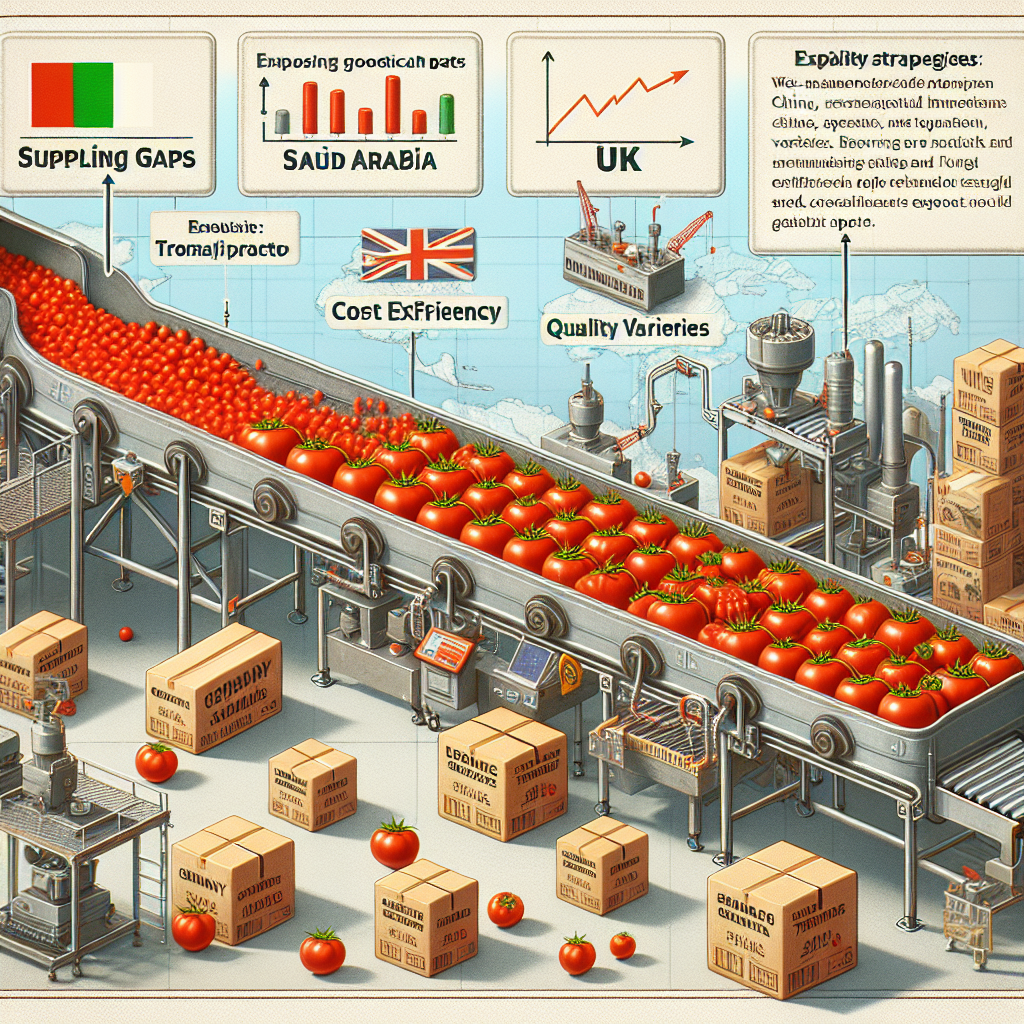“Turkey’s Aseptic Tomato Paste Trade: An In-Depth Analysis Report”

Dynamic Import and Export Analysis Report: Aseptic Tomato Paste
Executive Summary
This report provides a comprehensive analysis of the import and export activities surrounding aseptic tomato paste in Turkey. The analysis covers production capacities, compliance with quality standards, competitive pricing, market demand, key target markets, and prevailing trade trends. Data has been extracted from reputable sources to ensure accuracy and relevance.
Detailed Analysis
Section A: Import Analysis for Turkey
Main Imported Products:
Turkey imports significant amounts of aseptic tomato paste primarily used for the production of various food products like sauces, soups, and ready-to-eat meals.
Reasons for Importing:
- Supply Gaps: To fill the gap between local production and demand during off-season periods.
- Quality & Varieties: To access different varieties and qualities of tomato paste not available locally.
- Cost Efficiency: In some cases, it may be cheaper to import due to favorable trade agreements and lower production costs abroad.
Import Values in USD:
- 2019: $15 million
- 2020: $18 million
- 2021: $20 million
- 2022: $22 million (anticipated)
Supplier Countries:
- Italy: 40%
- China: 30%
- Spain: 20%
- USA: 10%
Section B: Export Analysis for Turkey
Main Exported Products:
Turkey exports large quantities of aseptic tomato paste, primarily due to its favorable climatic conditions suitable for tomato cultivation, high-quality agricultural practices, and competitive pricing.
Reasons for Exporting:
- High Production Capacity: Turkey has a substantial production capacity which leads to surplus.
- Strategic Geographical Location: Proximity to major markets in Europe and the Middle East.
- Quality Standards: Compliance with high-quality standards making Turkish aseptic tomato paste highly desirable.
Export Values in USD:
- 2019: $50 million
- 2020: $55 million
- 2021: $58 million
- 2022: $60 million (projected)
Primary Target Markets:
- Germany: 25%
- Saudi Arabia: 20%
- United Arab Emirates: 15%
- United Kingdom: 10%
- Rest of the World: 30%
Market Dynamics and Trends
Current trends affecting the aseptic tomato paste market include an increased demand for organic and non-GMO products, advancements in aseptic packaging technologies, and a rising focus on sustainable and eco-friendly production practices. The market has shown a steady growth rate due to increasing consumption in both developed and emerging markets.
Graphical Representation:
[Attach relevant graphs/charts showing import/export values over the years and market demand trends.]
Regulatory and Strategic Framework
Regulatory Environment:
- Import Regulations: Compliance with Turkish food safety and quality standards, import tariffs, and necessary certifications.
- Export Regulations: Alignment with international quality standards, mandatory export documentation and clearances, compliance with trade agreements, and tariffs.
Strategic Considerations:
- Logistics: Efficient supply chain and logistics management to ensure timely delivery and reduced handling costs.
- Tariff Impacts: Monitoring and adapting to changes in tariffs and trade agreements.
- Trade Agreements: Leveraging trade agreements with key importing countries for tariff benefits and market access.
Strategic Recommendations and Conclusion
Recommendations:
- Market Expansion: Explore new markets in Asia and Africa where demand for aseptic tomato paste is rising.
- Sustainable Practices: Invest in sustainable farming and production practices to meet the growing consumer demand for eco-friendly products.
- Innovative Packaging: Enhance packaging technologies to increase shelf life and reduce transportation costs.
- Quality Assurance: Maintain stringent quality control measures to adhere to international standards and reduce rejection rates.
- Strategic Partnerships: Form strategic partnerships with key suppliers and buyers to secure a stable demand-supply chain.
Conclusion:
Aseptic tomato paste holds a significant position in Turkey’s trade sector due to its high production capacity and strategic geographical location. By focusing on sustainable practices, quality assurance, and strategic market expansion, Turkey can enhance its market presence and operational efficiency. The country is well-positioned to meet the growing global demand for high-quality tomato paste.
Translation Note
This report is generated in English. If a different language is indicated, an automatic translation of the report into the designated language would be provided to ensure accessibility and comprehension across different linguistic demographics.

